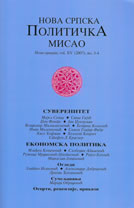| NSPM in English | |||
Bosnia Continues to Unravel |
 |
 |
 |
| четвртак, 27. август 2009. | |
|
Consequently, ever since 1995 Bosnia has been on a downward spiral. Bosnia is an artificial state that has never gelled into a viable, unified political community. Sadly, Western powers, especially the United States, cling desperately to the myth of Bosnia. Today, we can point to three critical, interconnected issues that, when taken together, point to a very serious, gathering crisis for Bosnia. As a result, the disintegration of Bosnia has gained momentum and it is likely that the “country” will face a serious, defining moment within the next year that may very well lead to the collapse of Bosnia. First, most important among these issues is increasingly serious crisis in inter-ethnic relations. The inability of the three ethnic communities to agree on the future of Bosnia means that there is no sense of a unified political community and this is a death-knell for any effort to construct a successful multi-ethnic state. This was demonstrated earlier this month when Mustafa Ceric, the Grand Mufti of the Islamic Community in Bosnia, visited Kosovo and called for Bosnian recognition of Kosovo’s independence. Ceric’s statement unleashed a firestorm of protest from Serb leaders, thus raising ethnic tensions to new heights. This prompted Edin Ramic, the leader of the Bosniak group in the Council of peoples in the Republika Srpska to warn about the possible expulsion of Bosniak’s from the Serb Republic. Although such a “cleansing” of Bosniaks from the RS is extremely unlikely, Ramic’s warning underscores how serious ethnic tensions have become. Second, is a broad “basket” of political differences that are becoming increasingly irreconcilable. These differences span a number of specific issues, including purely domestic questions as well as relations with the High Representative (HR) and the Western presence in Bosnia. Perhaps the three most important issues among these are the ongoing disagreements over state property, the likelihood of a criminal indictment against RS Prime Minister Dodik and constitutional reform. Continued and deepening disagreement over whether real property is owned by the Bosnian state or the entities could easily undermine any future hope that Bosnia will survive and it is extremely unlikely that the HR’s heavy hand will be able to resolve it to the satisfaction of all parties. The indictment against Dodik, which could come in September, is most likely to result in a hardening of positions between the leadership in the RS and the Federation without resolving any legal questions. Finally, discussions on constitutional reform, which are supposed to begin next month, have very little chance of leading to a more unified, centralized Bosnia. And, if all constitutional questions are “laid on the table”—especially the existence of the entities--it could lead quickly to a total and final unraveling of Bosnia. There also is fundamental disagreement over the political role of the “international community” (in reality, a handful of Western powers), with Bosniak leaders generally in favor of a continuing strong hand for them in Bosnian affairs and RS leaders generally opposed to interference by the “international community.” This difference is manifest in such specific issues as the role of foreign judges, the HR’s determination to control the issue of state property, and the charge by leaders in the RS that the HR is biased against Serbs. The most contentious political issue is disagreement over closure of the Office of the High Representative (OHR) and most likely also the EUFOR mission. The RS leadership is convinced that both of these organizations have long outlived their usefulness, while the leadership in the Federation is certain that they remain important for the future of Bosnia. At this point, the future of the OHR (and EUFOR) is unclear. Officially, the OHR continues to insist that the satisfying the “five plus two” agenda ia a condition for closure. But, there is almost no hope that these conditions will ever be satisfied. If the OHR closes by the end of the year, as many hope, it will have to do so with the “five plus two” agenda unsatisfied. Third, the dismal and deteriorating economic situation in Bosnia is having a devastating impact on the viability of the Bosnian state. Although all of Bosnia is feeling the effects of the worldwide economic downturn, it is being felt most keenly in the Federation. Even before the economic crisis, the Federation had fewer cash reserves and was attracting fewer foreign investments than the RS. Officials in Sarajevo report that foreign investment in Bosnia is down a staggering 400 percent this year and unemployment is over 40 percent. More than one quarter of Bosnia’s population lives below the poverty line, public debt is 40 percent of GDP, the current account balance is a negative $2.85 billion and the external debt is now more than $8.3 billion. Although the EU recently decided to provide Bosnia with 39 million Euros, this aid will have little impact in a country with such deep economic problems. Indeed, Bosnia’s depressing economic conditions are pushing the two entities further apart as they each try to protect what they have and scramble for more economic resources. The fact that the RS is ahead in this struggle only widens the gulf between them. And, what are the Western powers doing in the midst of this crisis? As usual, they continue to preach outmoded ideas and failed solutions. They push the “five plus two” agenda, engineer a Bosnian decision to participate in the NATO exercise Joint Endeavor and fund an operational command and control center in Sarajevo. Sadly, none of these projects has anything to do with the real needs of Bosnia, and their irrelevance to Bosnia’s real needs makes the Western powers increasingly irrelevant and helps deepens the crisis in Bosnia. Western leaders insist that “first and foremost, Bosnia must remain one, sovereign country.” But, they never say why! |
Од истог аутора
Остали чланци у рубрици
- Playing With Fire in Ukraine
- Kosovo as a res extra commercium and the alchemy of colonization
- The Balkans XX years after NATO aggression: the case of the Republic of Srpska – past, present and future
- Из архиве - Remarks Before the Foreign Affairs Committee of the European Parliament
- Dysfunction in the Balkans - Can the Post-Yugoslav Settlement Survive?
- Serbia’s latest would-be savior is a modernizer, a strongman - or both
- Why the Ukraine Crisis Is the West’s Fault
- The Ghosts of World War I Circle over Ukraine
- Nato's action plan in Ukraine is right out of Dr Strangelove
- Why Yanukovych Said No to Europe

.jpg)








 Almost 15 years ago Western powers moved forcefully into the Balkans and attempted to establish a multi-ethnic democracy in Bosnia Herzegovina. Although the Dayton Accords may have been well intended, unfortunately they were crafted in ignorance and arrogance. They reflected Western preferences and interests and were based on the conviction that only a Western imposed model would work. They dismissed any notion that the preferences, interests and convictions of the locals were valid and ignored the political realities in Bosnia.
Almost 15 years ago Western powers moved forcefully into the Balkans and attempted to establish a multi-ethnic democracy in Bosnia Herzegovina. Although the Dayton Accords may have been well intended, unfortunately they were crafted in ignorance and arrogance. They reflected Western preferences and interests and were based on the conviction that only a Western imposed model would work. They dismissed any notion that the preferences, interests and convictions of the locals were valid and ignored the political realities in Bosnia.












